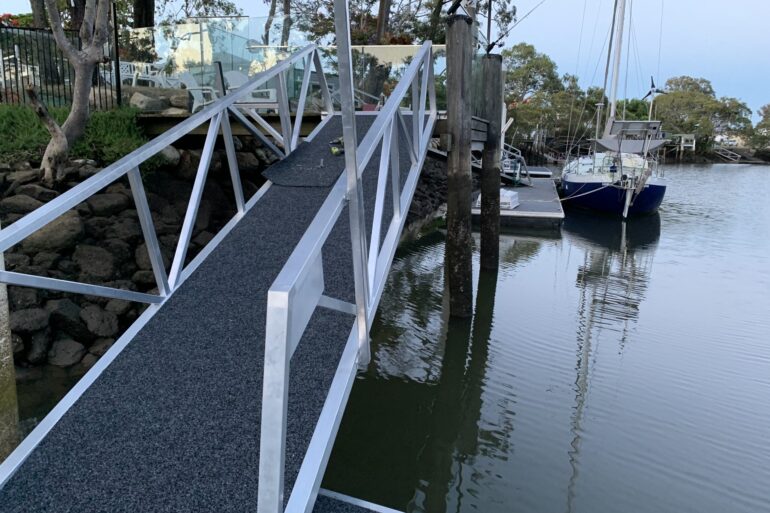
Pontoon docks are a popular way to dock a boat on the Gold Coast, and for good reason—they’re sturdy, easy to set up, and flexible enough to accommodate a variety of watercraft. But what are the pros and cons of using cable pontoons instead of the strut or piled counterparts?
If you’ve been thinking about adding a pontoon dock to your property, you may wonder if a cable pontoon is the right solution. But before you dive in and purchase a pontoon dock, it’s important to weigh the pros and cons of each type to determine which one is the best fit for your needs.
In this article, we will compare the pros and cons of cable pontoons to other pontoon types so that you can make an informed decision about which pontoon dock is right for you.
Table of Contents
What is a Cable Pontoon?
A pontoon, also sometimes called a “floating dock, pontoon dock, or floating pontoon”, is a type of dock that consists of one or more pontoons.
Pontoons are essentially large floats that support a platform. They are prevalent because they are relatively easy and inexpensive to install and offer various applications. For example, pontoons are often used as swimming platforms, fishing docks, or simply as a place to relax and enjoy the water.
Cable pontoon docks are a specific type of pontoon that uses cables to anchor the dock to the shore.
What are the advantages of a Cable Pontoon?
Cable pontoons are a popular pontoon type, but they’re not suitable for everyone. So here’s a look at the pros and cons of cable pontoons.
Cable pontoon docks are popular across homes on the Gold Coast because they are stable, secure, and easy to build. Additionally, they can be used in waters of any depth, making them ideal for use in lakes or rivers. And, because they are held in place by cables, not piles, they are ideal for waters with rocky terrain.
Another advantage of cable pontoons is, of course, their affordability. They are the cheapest pontoon type, a major drawcard for many gold Coast homeowners. Additionally, they require less maintenance than other types of pontoon docks, making them also more affordable over the long run.
Advantages of a Cable Pontoon compared to other pontoons
While cable pontoons offer several benefits in general, let’s see how they compare to their counterparts:
- Compared to strut arm pontoons, cable pontoons are more stable. So, they’re less likely to be damaged in high winds or rough waters. They are also more durable than strut arm pontoons, requiring less maintenance over time.
- Compared to piled pontoons, cable pontoons are cheaper to install and can be used in deeper waters. Additionally, cable pontoons don’t require the regular maintenance that piles do, making them a more low-maintenance option.
What are the disadvantages of a Cable Pontoon?
Cable pontoon docks are popular among boaters because they are relatively affordable and easy to install, but there are also several disadvantages to this type of dock.
One of the biggest problems is that cable pontoon docks can become unstable in strong winds or waves. This is because the cables supporting the pontoon can break or become loose, making the pontoon wobbly and in need of repair.
Additionally, cable pontoon docks generally have a shorter lifespan than their more expensive counterparts. While they may be a good option for budget-conscious boaters, it is important to weigh all the pros and cons before making a purchase.
Disadvantages of a Cable Pontoon compared to other pontoons
As we’ve seen, there are several disadvantages to cable pontoons. Let’s take a look at how they compare to other types of pontoons:
- Compared to strut arm pontoons, cable pontoons are less stable and have a shorter lifespan. Additionally, they are more likely to be damaged in high winds or waves.
- Compared to piled pontoons, cable pontoons are less stable and have a shorter lifespan. Additionally, they require more maintenance over time.
- If you are lucky to have a bit of beach on your waterfront property, the crisscrossing cables mean you lose the use of this beach area.
Is a Cable Pontoon Right for you?
So, there you have it! The pros and cons of cable pontoons. As you can see, this type of pontoon has both advantages and disadvantages. However, now that you know the advantages and disadvantages of a cable pontoon, you can decide if this type of pontoon is right for you.
A cable pontoon may be a good choice if you are looking for an affordable, easy installation option. However, if you are looking for a long-lasting pontoon that can withstand strong winds and waves, you may want to consider another type of pontoon dock.
To learn more, consider also reading:
Conclusion
Pontoons come in various types, each with its own set of pros and cons. In this article, we have looked at the pros and cons of a cable pontoon.
Cable pontoons are less expensive than strut arm pontoons but are also marginally less stable and durable. However, if you live in an area with rough waters or have a large boat, a cable pontoon may not be the best option.
If you have any questions about whether a cable pontoon is right for you, please call Micks Marine Maintenance on 0431 778 468. We can assess your specific needs and make a recommendation based on your budget and location.
For more information on cable pontoons, please visit our Cable Pontoons page.